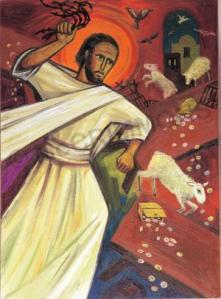The prophet's unrecognized messageThroughout the year, the Southern New England Conference of the United Church of Christ reproduces the Daily Lectionary for use by churches. These are the suggested readings for Wednesday, March 24th: Psalm 119:9-16; Haggai 2:1-9, 20-23; and John 12:34-50. I would encourage you to read these short selections as part of your Lenten practice.
We have been enjoying some interesting discussions about prophecy in our Bible study group recently. (If you would like to join in our next meeting is on March 29th at 7PM. Send me an email at [email protected] and I’ll get you the login link.) At our last meeting, we discussed this Haggai passage specifically. Some background: The book of Isaiah most likely consists of three separate books. The third Isaiah book is found in chapters 56-66. This is a late Exile prophet writing for a people who are envisioning a return to the homeland of their ancestors. His writing concludes with this revelation of God: “Heaven is my throne and the earth is my footstool; what is the house that you would build for me … This is the one to whom I will look, to the humble and contrite in spirit, who trembles at my word.” (66:1,2) Further back in Israel’s history, before the Exile, Jeremiah had a confrontation with one who claimed to be a prophet, Hananiah son of Azzur. Jeremiah has been proclaiming Jerusalem’s imminent defeat. Instead, Hananiah promises restoration and his order of priorities is first the return of the gold vessels of the Temple, second the restoration of the king, and lastly a return of those who had been sent as surety to Babylon. Hananiah dies as a false prophet. (ch. 28) Now an impoverished remnant returns to Jerusalem and Haggai prophesies to them. He tells them of the restoration of Davidic majesty through Zerubbabel. This Davidic heir has Messianic expectations pinned to him. However, Zerubbabel fades unnoticed into history. Nothing becomes of him. And he is the replacement for an even earlier hope, Sheshbazzar, who likewise failed to live up to the expectations. Additionally, Haggai foresees the rebuilding of a Temple more richly adorned than Solomon’s: “Once again, in a little while, I will shake the heavens and the earth and the sea and the dry land; and I will shake all the nations, so that the treasure of all nations shall come, and I will fill this house with splendour, says the Lord of hosts. The silver is mine, and the gold is mine, says the Lord of hosts. The latter splendour of this house shall be greater than the former, says the Lord of hosts; and in this place I will give prosperity, says the Lord of hosts.” What happened to Third Isaiah’s admonition that God was not impressed with a gilded house, but with a people who served as His living temple through the way they lived? What about Hananiah being judged a false prophet for his insistence that Temple treasures were of the utmost importance? How do we reconcile this with Haggai’s emphasis upon the splendour of the envisioned new Temple? With this earlier tradition in mind, and considering the fact that Haggai’s predictions were left unfulfilled, isn’t it possible that Haggai’s numinous prophetic experience was misinterpreted by him? Could he have experienced a powerful presence of God that assured him of restoration and the abiding divine presence, but that Haggai expressed this too traditionally as a return to the old rather than to the ushering in of the “new covenant” (Jeremiah 31:31) that Rev. Terry spoke about in her sermon this past Sunday? This past weekend I read an intriguing article in the Boston Globe. Here’s an excerpt: “If there was one thing he’d learned from his forays into the history of science, it’s that generations of people tend to look in the same place for answers. It takes a Darwin in the Galápagos to really change what we think we know — and make a new truth seem as though it had been obvious all along.” (www.bostonglobe.com/2021/03/19/magazine/how-college-dropout-new-hampshire-found-shakespeare-secret-all-phds-missed ) I hope and pray that each Lenten season pushes us to look beyond the same places and the obvious, and to discover the fresh insights that our faith in a crucified Saviour calls us toward. Remember that Jesus disrupts and rejects the Temple and spends His time among society’s, and religion’s, outcasts, and dies as one of the same. The tradition of our faith is not to be limited by the traditional. If you’d like, here is the link to the Massachusetts Conference’s daily reading schedule: www.sneucc.org/lectionary.
0 Comments
Leave a Reply. |
NewsFaith, love and chitchat. Categories
All
Archives
June 2024
Follow
|
|
SERVICE TIMES
Sunday 9:30-10:30am Children Sunday School 9:30-10:30am Nursery care available during worship DONATE Make a single or recurring contribution by clicking here |
FOLLOW
|

 RSS Feed
RSS Feed
